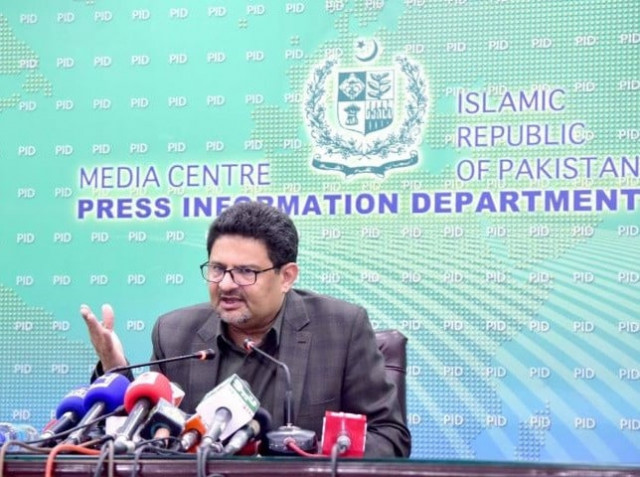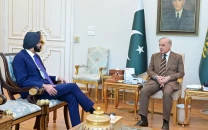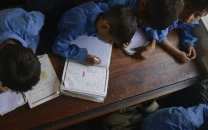Govt caves in to IMF, drops petrol bomb
Move to help pave way for reaching a staff-level agreement with foreign lender

In a surprise move, the government on Thursday increased the petroleum products rates by Rs30 per liter, or up to one-fourth of their existing prices, paving the way for reaching a staff-level agreement with the International Monetary Fund by June 12.
The unprecedented decision will help defuse the landmines laid by the government of former prime minister Imran Khan on the one hand, and will save the country from looming default on the other.
Finance Minister Miftah Ismail made the decision public in an unscheduled news conference after Prime Minister Shehbaz Sharif gave him the go-ahead in a party meeting.
“The federal government has decided to raise the prices of petroleum products by Rs30 per liter, with the hike set to go into effect at midnight tonight,” said Ismail.
With the fresh hike, the new price of petrol will be Rs179.88 per liter -- the highest ever rate -- and showing an increase of 20% over the existing prices. Ismail said that it was a “difficult decision that will erode political capital” of the government.
“The government was giving Rs56 per liter subsidy and I have only reduced the loss by Rs30 per liter,” said Miftah while addressing the news conference. High-speed-diesel new price will be Rs174.86 per liter, showing an increase of 20.8%.
Miftah said that the government was giving Rs86 per liter subsidy, and in the first batch it has reduced the subsidy amount by only Rs30.
“The government cannot take the country towards default and is ready to pay the political cost for the sake of protecting the interest of the state,” said the finance minister.
“There is an option whether to protect political interests of the government or save the country from default and we have decided to protect the state’s interests,” said the finance minister.
The government also increased light diesel oil price by 25.4% to Rs148.31 per liter and kerosene by 24% to Rs155.56 per liter. The federal government had approved Rs157 billion subsidies for March 1 to May 15 period, which were expected to touch to Rs300 billion in case the prices remained unchanged till the end of June.
The next big action that the government is now required to take is to increase electricity prices by Rs5 per unit with effect from June 1, said the sources.
The total increase in the prices will be around Rs12 per unit that will include the withdrawal of Rs5 per unit electricity subsidy and the quarterly and annual tariff adjustments.
However, the decision will stoke inflation that was already at 13.4% in April -- the highest in two years. The government had a choice to take the hit by increasing the prices or let the rupee weaken in the absence of an IMF deal, with thin foreign exchange reserves that could have caused hyperinflation.
But the government moved only after the IMF refused to sign on a staff level agreement until Pakistan takes corrective measures, including reversal of fuel subsidies and an agreement over next year’s budget.
“With the increase in prices, a major hurdle to reaching a staff-level agreement has been removed and a deal could be reached before June 12,” said the minister. He added the remaining outstanding issues were not very complicated and the matters could now be sorted out within days.
The minister said that the gap between the assessment of the IMF and the government about the next year’s budget were not huge, hoping to bridge them in coming days.
The government’s decision to increase the prices at the expense of the political capital suggests that it might have won a nod from the establishment to stay in power longer than earlier thought.
The government had refused to take tough decisions and then call snap elections just to pave the way for the victory of the PTI.
The journey towards restoring the macroeconomic stability may also help stem the rupee losses that dipped to the new lowest level of Rs203 to a dollar on Thursday. The foreign exchange reserves also dropped to $10 billion, according to the central bank.
In its handout, the IMF had emphasised the urgency of concrete policy actions, including in the context of removing fuel and energy subsidies and the FY2023 budget, to achieve programme objectives.
The IMF had said that considerable progress had been made during the mission-level talks, including on the need to continue to address high inflation and the elevated fiscal and current account deficits, while ensuring adequate protection for the most vulnerable.
“These are the landmines the previous government laid when Imran Khan reduced electricity rates by Rs5 per unit and petroleum rates by Rs10 per liter,” said Miftah, adding that global crude oil prices had jumped from $85 a barrel at the time to over $108.
By doing so, the previous government had not damaged the Pakistan Muslim League-Nawaz (PML-N) but played havoc with the national economy, he said.
Former finance minister Shaukat Tarin had given commitments to the IMF not to give “any subsidy”, and impose Rs30 per litre petroleum levy and 17% GST, said the minister.
The PML-N had criticised the PTI government for charging higher petroleum development levy and GST rates, as the party was never in favour of giving subsidies, said Ismail.



















COMMENTS
Comments are moderated and generally will be posted if they are on-topic and not abusive.
For more information, please see our Comments FAQ